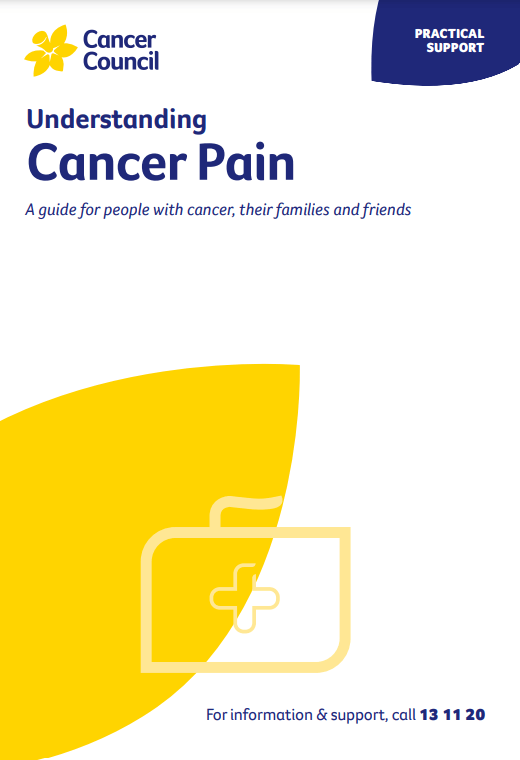- Home
- Cancer Information
- Managing side effects
- Pain and cancer
- Pain after treatment
- Ways to manage persistent pain after treatment
Ways to manage persistent pain after treatment
- Talk to your doctor about suitable medicines such as mild pain medicines and how the physical, emotional and social consequences of chronic pain affect how you cope with the pain.
- Become more actively involved in managing your pain. This has been shown to help reduce pain. Learning how pain works can help you think about the pain differently and increase your confidence to do daily activities.
- Try psychological therapies to change the way you think about and respond to pain.
- Consider complementary therapies, such as creative therapies or meditation.
- Set small goals if pain stops you from enjoying your daily activities. Gradually increase your activity, e.g. if it hurts to walk, start by walking to the front gate, then to the corner, and then to the bus stop up the road.
- Go for a walk and do some gentle stretching every day. Movement will keep your muscles conditioned and help you deal with the pain.
- Pace your activities during the day, and include rest and stretch breaks.
- Include relaxation techniques in your daily routine. These may improve how well other pain relief methods work and also help you sleep.
- Build a network of people who can help you. This may include family, friends and volunteers.
- See Living well after cancer booklet.
- Listen to our relaxation and meditation podcast Finding Calm During Cancer.
Podcast: Managing Cancer Pain
Listen now
More resources
Dr Tim Hucker, Pain Medicine Specialist, Peter MacCallum Cancer Centre, VIC; Dr Keiron Bradley, Palliative Care Consultant, Bethesda Health Care, WA; A/Prof Anne Burke, Co-Director Psychology, Central Adelaide Local Health Network, President, Australian Pain Society, Statewide Chronic Pain Clinical Network, SA, School of Psychology, The University of Adelaide, SA; Tumelo Dube, Accredited Pain Physiotherapist, Michael J Cousins Pain Management and Research Centre, Royal North Shore Hospital, NSW; Prof Paul Glare, Chair in Pain Medicine, Palliative Medicine Specialist, Pain Management Research Institute, The University of Sydney, NSW; Andrew Greig, Consumer; Annette Lindley, Consumer; Prof Melanie Lovell, Palliative Care Specialist HammondCare, Sydney Medical School and The University of Technology Sydney, NSW; Caitriona Nienaber, 13 11 20 Consultant, Cancer Council WA; Melanie Proper, Pain Management Specialist Nurse Practitioner, Royal Brisbane and Women’s Hospital, QLD; Dr Alison White, Palliative Medicine Specialist and Director of Hospice and Palliative Care Services, St John of God Health Care, WA.
View the Cancer Council NSW editorial policy.
View all publications or call 13 11 20 for free printed copies.
Need to talk?
Support services
Coping with cancer?
Speak to a health professional or to someone who has been there, or find a support group or forum
Work and cancer
Information for employees, employers and workplaces dealing with cancer
Cancer information
Relaxation and meditation podcast
Listen to our podcast to learn relaxation and meditation techniques
View our publications
Guides and fact sheets for people with cancer, their families and friends


